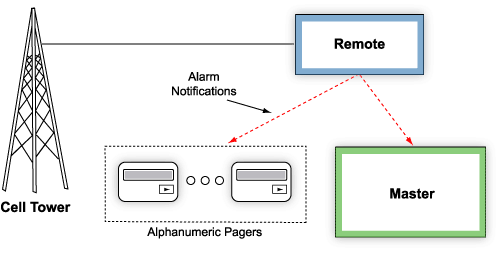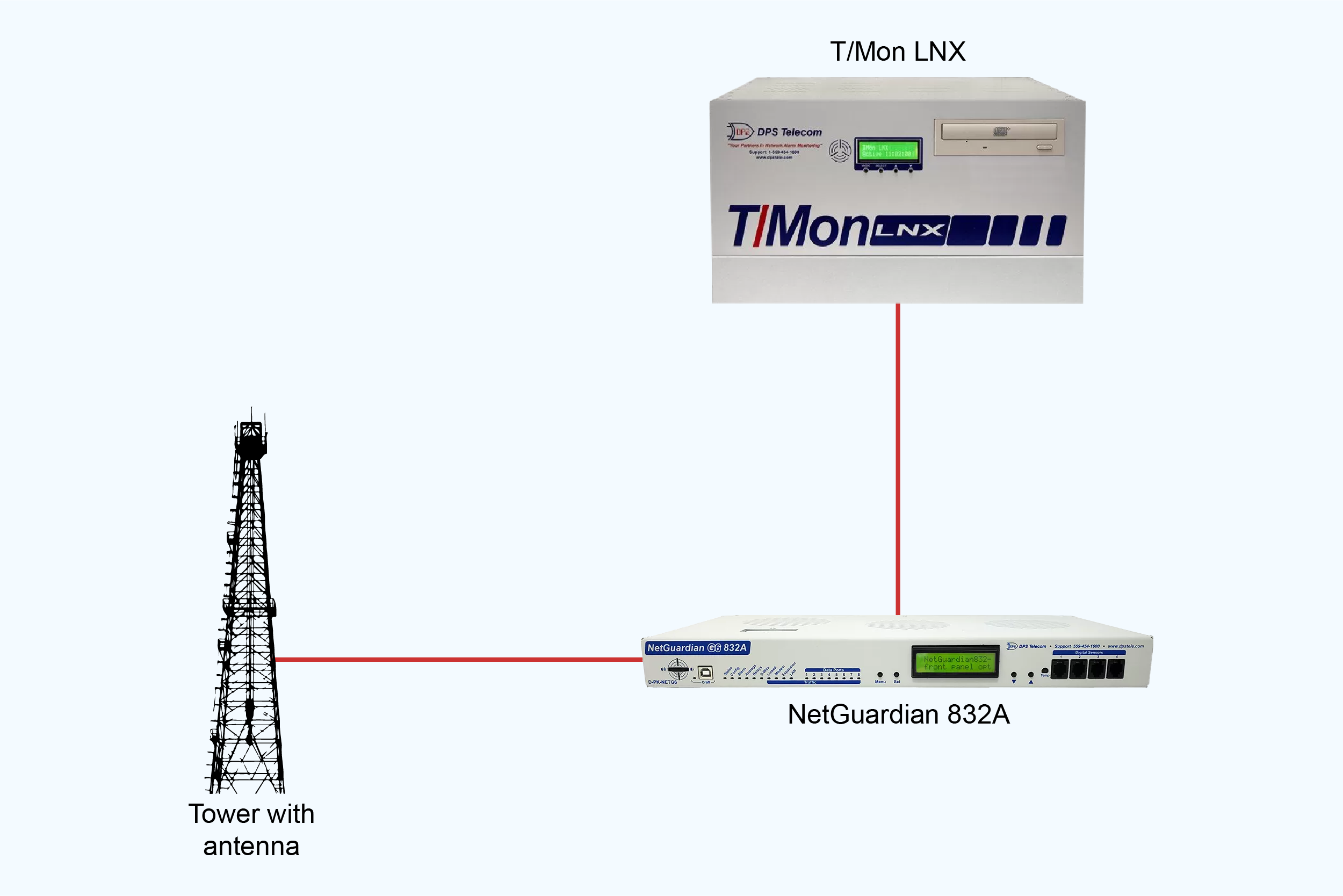Check out our White Paper Series!
A complete library of helpful advice and survival guides for every aspect of system monitoring and control.
1-800-693-0351
Have a specific question? Ask our team of expert engineers and get a specific answer!
Sign up for the next DPS Factory Training!

Whether you're new to our equipment or you've used it for years, DPS factory training is the best way to get more from your monitoring.
Reserve Your Seat TodayAntenna theft can disrupt critical communications and cause big downtime incidents. Replacing an antenna can be a tiny inconvenience compared to the service disruption itself.
JP, a DPS Telecom engineer, recently chatted with a representative from a multinational telecommunications vendor to discuss an advanced solution for monitoring microwave antennas on large towers. The client needed a system to monitor these antennas to prevent theft.
This use case highlights best practices for monitoring systems that maintain the integrity and functionality of critical transmission infrastructure. Here's the chat:

This is a topology diagram for 16 tower sites. They all have LAN connection. This allows RTUs in NEMA enclosures to communicate back to your SNMP manager. The RTUs can also send email/SMS directly to smartphones.

Client: Does your company have an antenna monitoring system?
JP: For VSWR monitoring?
Client: How about monitoring the antenna as an asset management system?
JP: What type of antenna are we talking about? Is this a large tower?
Client: Yes, large tower. Microwave antenna. Transmission Network.
JP: Ok, I understand. What are you wanting to monitor the antenna for? What are you trying to accomplish?
Client: To monitor the asset for theft prevention, etc.
JP: Are people climbing the tower and removing the antenna?
Client: Not always like that, but sometimes. Some antennas are dismantled for relocation or to be kept in a warehouse. We need to trace all those antennas.
JP: Ahh, you want to trace with GPS?
Client: Not necessarily integrated with GPS, but it would be a plus if it can.
JP: Ok, yes we can provide a solution. We can monitor if the microwave is dismantled and attempt to prevent unauthorized removal. We can monitor the transmission. If the transmission is stopped, either someone has cut wires while attempting to remove, or the device may have failed. How many sites?
Client: We have 5000-10000 sites. Each site has 2-3 antennas.
JP: Do you know what frequency the antennas are using?
Client: Various. Mostly 6-7 GHz.
JP: We could use a sensor such as that one from BirdRF.
Client: Ok, how about the application and software? Any brochure for the software?
JP: The sensor would connect to a device similar to the NetGuardian 832A. Then you would use the T/Mon as a Central Server to see everything in one device. Here are some links to our products:
www.dpstele.com/products/alarm-master/d-pk-tmlnx.php
www.dpstele.com/products/alarm-master/d-pk-tmlnx/docs/ps/tmon_lnx_prod_sum.pdf
JP: I just sent you an email so you have my direct contact information.
Client: Thank you so much.
JP: Would you like to review the documentation and perhaps schedule a web meeting to discuss further?
Client: Yes, I'm checking the solution now.
JP: What is the current time in your location?
Client: 9:49 AM.
JP: I am getting ready to leave for the day. Chat will be unavailable. Is there anything else you would like to discuss before I leave?
Client: No, thank you.
JP: You're welcome. Feel free to reach out to me via email if you have additional questions or would like to hop on a web meeting with you and your team.
The client reached out inquiring about certain monitoring systems:
"Does your company have an antenna monitoring system?"
The client continued by describing their requirements. They mentioned needing to monitor their antennas for theft prevention at multiple sites:
"We need to monitor the asset for theft prevention, etc."
This inquiry implies the need for a solution that can detect unauthorized antenna removal and provide comprehensive asset management.
As any vendor should, JP started by clarifying the specific needs of this client:
"Are people climbing the tower and removing the antenna?"
The client confirmed that sometimes that is the case. While this theft was the main concern, they were curious about tracking antennas that were dismantled. Understanding the need for precise monitoring, JP proposed:
"We can monitor if the microwave is dismantled and attempt to prevent unauthorized removal."
While GPS tracking was not mandatory, the solution offered by JP could detect interruptions in transmission. This indicates potential theft or tampering.
JP continued describing a proposed solution:
"If the transmission is stopped, either someone has cut wires while attempting to remove, or the device may have failed."
Next, JP asked about the size of the project. The client responded by estimating their number of sites:
"We have 5,000-10,000 sites. Each site has 2-3 antennas."
Given the scale of the project, scalability was (and would continue to be) crucial. JP then inquired about the antenna frequencies:
"Mostly 6-7 GHz."
This response guided JP to suggest potential sensor solutions:
"We could use a sensor such as the one from BirdRF,"
These sensors ensure compatibility with the antenna frequencies used by the client.
When dealing with a diverse range of frequencies and sites, flexibility in monitoring solutions is key. JP noted that the NetGuardian 832A (or a similar RTU) could connect with various sensors to monitor different parameters across numerous locations efficiently. These parameters include signal strength and other evidence of potential tampering, both of which were concerns.
The NetGuardian series offers a range of configurations that can be tailored to meet specific requirements. Whether you need to monitor voltage, signal integrity, or physical security, these devices can be customized to give you the data you need.

To provide a cohesive monitoring experience, JP introduced the idea of integrating sensors with a central monitoring system:
"The sensor would connect to a device similar to the NetGuardian 832A. Then you would use the T/Mon as a Central Server to see everything in one device."
This setup centralizes monitoring, making it easier to manage and analyze data from multiple sites. JP provided additional resources to help the client understand the proposed solution:
www.dpstele.com/products/alarm-master/d-pk-tmlnx.php
www.dpstele.com/products/alarm-master/d-pk-tmlnx/docs/ps/tmon_lnx_prod_sum.pdf
This step made sure that the client had all the necessary information to make an informed decision about the monitoring system.
Effective monitoring isn't just about hardware. Yes, you need the right transport and connectors, but software takes things from there.
T/Mon, for example, is able to consolidate alarm data from various sources. This provides a comprehensive view of your network's status. This software supports multiple protocols, allowing it to communicate with a wide range of devices and systems.
By using T/Mon, network managers can quickly identify and address issues. This ability to respond quickly reduces downtime and enhances operational efficiency.
Investing in a scalable and flexible monitoring solution also prepares your infrastructure for the future. As your network grows or technology advances, your monitoring system needs to keep pace.
The T/Mon, as mentioned by JP, gives you the potential for integrating new technologies and expanding the system as needed.
By choosing solutions like the T/Mon and NetGuardian, you give your monitoring infrastructure the ability to adapt to future demands. The modular design of these products allows for easy upgrades and expansions. Having an approach like this both addresses your current needs and prepares you for future challenges.
DPS Telecom's solutions are designed to meet the complex needs of large-scale antenna monitoring and asset management. Whether you're looking to prevent theft, monitor performance, or manage your assets more effectively, DPS gear is reliable, scalable, and cost-effective (especially when compared to the cost of NOT monitoring properly).
To get started, call DPS Telecom now at 1-800-693-0351 or email sales@dpstele.com to tell us what you're trying to accomplish.

Andrew Erickson
Andrew Erickson is an Application Engineer at DPS Telecom, a manufacturer of semi-custom remote alarm monitoring systems based in Fresno, California. Andrew brings more than 19 years of experience building site monitoring solutions, developing intuitive user interfaces and documentation, and opt...